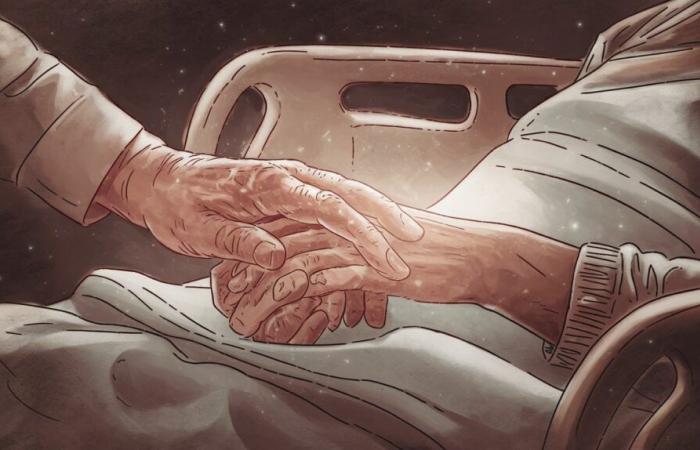A French septuagenarian acquitted after strangling his sick wife “for love”. The trial revives the debate on the legislation governing the end of life in France. Should the law be changed to avoid these kinds of tragedies? The question divides…
A family drama that raises deep societal questions. Bernard Pallot, 78, has just been acquitted by the Aube Assize Court after being accused of having murdered his wife Suzanne, who suffered from serious pathologies. The man, who admits to having strangled her with an electric wire, claims to have acted “out of love” and at the request of his wife to alleviate her suffering which had become unbearable.
This highly publicized trial has relaunched the debate on French legislation governing the end of life. While a bill aimed at legalizing assisted suicide was under discussion in the National Assembly last June, its examination was interrupted just before the vote due to the dissolution of the Assembly. For Bernard Pallot himself, this trial “testifies to the inadequacy of the law which puts us, the individuals, in difficult situations”.
A husband in despair over his wife’s suffering
Married since 1969 to Suzanne, Bernard Pallot explained during the investigation that he wanted to put an end to the “incurable” suffering of his septuagenarian wife, suffering from several serious pathologies including Carrington’s disease, chronic pneumonia, and osteoporosis with multiple fractures.
According to his statements, he first tried to kill her by injecting her with cyanide, without success. It was then that, “in improvisation” and having “no choice”, he grabbed a piece of electric wire to strangle her for around twenty minutes. A “slightly wild” act by his own admission, but motivated by love and the desire to respect Suzanne’s wishes.
Farewell words and a written request
According to a source close to the investigation, Suzanne Pallot said goodbye to her only son by telephone on the day of the tragedy. In addition, a handwritten note signed by him was found near his body. It read: “I, the undersigned, Pallot Suzanne, still of sound mind, ask my husband, Bernard Pallot, to relieve me definitively of the incurable suffering that I am enduring.”
During his hearing, the couple’s son said his father had acted “out of love, out of compassion” towards his mother. A position shared by the defense, Me Frédéric Verra, for whom “if euthanasia were legal, Bernard Pallot would not have strangled his wife with an electric wire”.
The difficult qualification of the facts
For the prosecution, on the other hand, represented by attorney general Mickaël Le Nouy, Bernard Pallot acted “in a determined, cold and violent manner” and “we cannot arrogate to ourselves the right to kill”. He had requested an 8-year prison sentence.
The court ultimately ruled in favor of the accused, in favor of an “excuse of irresponsibility” linked to the “constraint” of the situation experienced by this retiree with a clean criminal record. While recognizing the facts, the jurors felt that he had no other choice in the face of his wife’s distress.
Towards an evolution of end-of-life legislation?
Beyond the particular case of Bernard and Suzanne Pallot, this trial raises the question of the adequacy of French law with the complex human situations linked to the end of life. As it currently stands, euthanasia and assisted suicide remain prohibited, even if the Claeys-Leonetti law of 2016 authorizes deep sedation and continues until death under certain strict conditions.
But for many French people, this legislation does not go far enough. According to an Ifop survey carried out in April 2021, 93% of those questioned said they were in favor of euthanasia in the case of incurable illnesses causing unbearable suffering.
This tragedy shows once again that we cannot leave citizens, often elderly, in such distress when faced with the suffering of a loved one. It is urgent to change the law to regulate the end of life in an ethical and humane way.
Jonathan Denis, president of the Association for the Right to Die with Dignity
In light of this extraordinary trial, the debate on euthanasia and assisted suicide promises to resurface with new urgency in the coming months. If the Pallot case illustrates the limits of current legislation, it also shows that the evolution of awareness on this major social issue still has a way to go.






